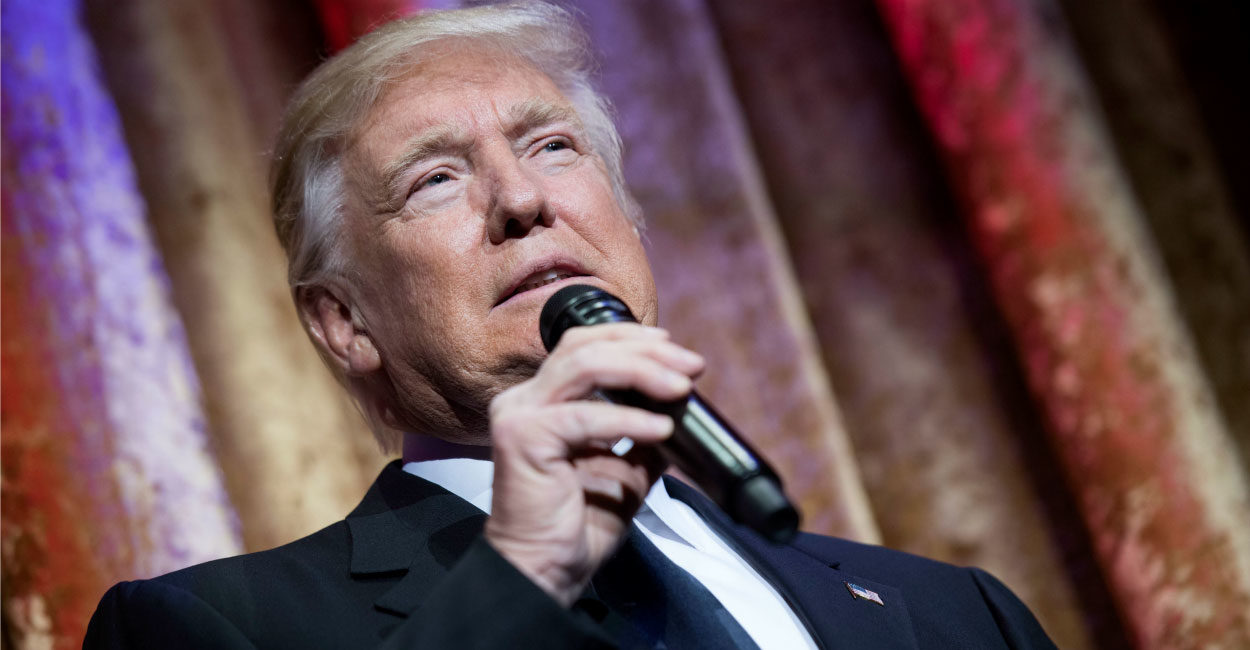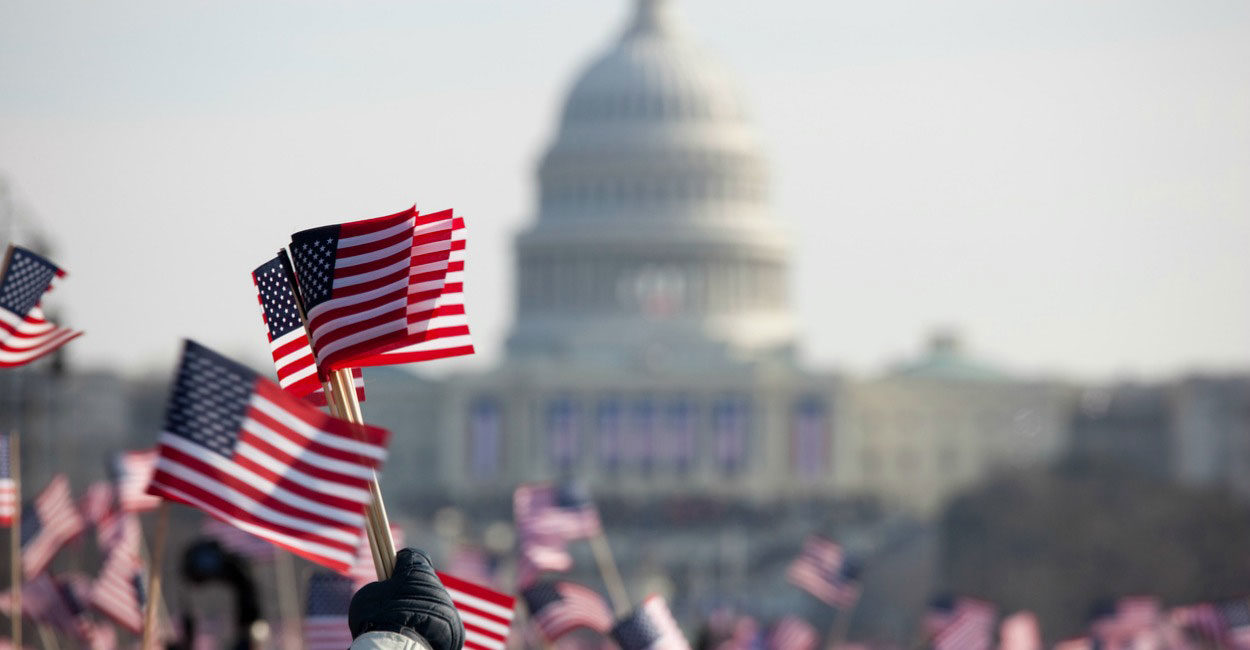333
Surprise: In Final Hours in Power, Obama Sent $221 Million to the Palestinians
Guy Benson

America's Second Civil War
Dennis Prager

In fact, with the obvious and enormous exception of attitudes toward slavery, Americans are more divided morally, ideologically and politically today than they were during the Civil War. For that reason, just as the Great War came to be known as World War I once there was World War II, the Civil War will become known as the First Civil War when more Americans come to regard the current battle as the Second Civil War.
This Second Civil War, fortunately, differs in another critically important way: It has thus far been largely nonviolent. But given increasing left-wing violence, such as riots, the taking over of college presidents' offices and the illegal occupation of state capitols, nonviolence is not guaranteed to be a permanent characteristic of the Second Civil War.
Day Two: President Trump Signs Three More Executive Orders
Katie Pavlich

1) Keystone pipeline approval, with the requirement piping used for construction be made in America
2) Dakota Access pipeline approval, with the requirement piping used for construction be made in America
3) Expediting environmental reviews for building permits
JUST IN: President Donald Trump signs executive orders advancing the construction of the Keystone XL and Dakota Access pipelines.
Egalitarianism and the Elites
By Murray N. Rothbard
The Alleged Self-Evidence of Equality
One of the great glories of mankind is that, in contrast to other species, each individual is unique, and hence irreplaceable; whatever the similarities and common attributes among men, it is their differences that lead us to honor, or celebrate, or deplore the qualities or actions of any particular person.1 It is the diversity, the heterogeneity, of human beings that is one of the most striking attributes of mankind.
This fundamental heterogeneity makes all the more curious the pervasive modern ideal of “equality.” For “equality” means “sameness” — two entities are “equal” if and only if they are the same thing. X = y only if they are either identical, or they are two entities that are the same in some attribute. If x, y, and z are “equal in length,” it means that each one of them is identical in length, say 3 feet. People, then, can only be “equal” to the extent that they are identical in some attribute: thus, if Smith, Jones and Robinson are each 5 feet, 11 inches in height, then they are “equal” in height. But except for these special cases, people are heterogeneous, and diverse, that is, they are “unequal.” Diversity, and hence “inequality,” is therefore a fundamental fact of the human race. So how do we account for the almost universal contemporary worship at the shrine of “equality,” so much so that it has virtually blotted out other goals or principles of ethics? And taking the lead in this worship have been philosophers, academics, and other leaders and members of the intellectual elites, followed by the entire troop of opinion-molders in modern society, including pundits, journalists, ministers, public school teachers, counselors, human relations consultants and “therapists.” And yet, it should be almost evidently clear that a drive to pursue “equality” starkly violates the essential nature of mankind, and therefore can only be pursued, let alone attempt to succeed, by the use of extreme coercion.
The Alleged Self-Evidence of Equality
One of the great glories of mankind is that, in contrast to other species, each individual is unique, and hence irreplaceable; whatever the similarities and common attributes among men, it is their differences that lead us to honor, or celebrate, or deplore the qualities or actions of any particular person.1 It is the diversity, the heterogeneity, of human beings that is one of the most striking attributes of mankind.
This fundamental heterogeneity makes all the more curious the pervasive modern ideal of “equality.” For “equality” means “sameness” — two entities are “equal” if and only if they are the same thing. X = y only if they are either identical, or they are two entities that are the same in some attribute. If x, y, and z are “equal in length,” it means that each one of them is identical in length, say 3 feet. People, then, can only be “equal” to the extent that they are identical in some attribute: thus, if Smith, Jones and Robinson are each 5 feet, 11 inches in height, then they are “equal” in height. But except for these special cases, people are heterogeneous, and diverse, that is, they are “unequal.” Diversity, and hence “inequality,” is therefore a fundamental fact of the human race. So how do we account for the almost universal contemporary worship at the shrine of “equality,” so much so that it has virtually blotted out other goals or principles of ethics? And taking the lead in this worship have been philosophers, academics, and other leaders and members of the intellectual elites, followed by the entire troop of opinion-molders in modern society, including pundits, journalists, ministers, public school teachers, counselors, human relations consultants and “therapists.” And yet, it should be almost evidently clear that a drive to pursue “equality” starkly violates the essential nature of mankind, and therefore can only be pursued, let alone attempt to succeed, by the use of extreme coercion.
Statistics: Achilles' Heel of Government
By Murray N. Rothbard

Ours is truly an Age of Statistics. In a country and an era that worships statistical data as super “scientific,” as offering us the keys to all knowledge, a vast supply of data of all shapes and sizes pours forth upon us. Mostly, it pours forth from the government. While private agencies and trade associations do gather and issue some statistics, they are limited to specific wants of specific industries. The vast bulk of statistics is gathered and disseminated by government. The overall statistics of the economy, the popular “gross national product” data that permits every economist to be a soothsayer of business conditions, come from government. Furthermore, many statistics are by-products of other governmental activities: from the Internal Revenue bureau come tax data, from unemployment insurance departments, come estimates of the unemployed, from customs offices come data on foreign trade, from the Federal Reserve flow statistics on banking, and so on. And as new statistical techniques are developed, new divisions of government departments are created to refine and use them.
The Ethics of Entrepreneurship and Profit
 In the most fundamental sense we are all, with each of our actions, always and invariably profit-seeking entrepreneurs.
In the most fundamental sense we are all, with each of our actions, always and invariably profit-seeking entrepreneurs.Whenever we act, we employ some physical means (things valued as goods) — at a minimum our body and its standing room, but in most cases also various other, “external” things — so as to divert the “natural” course of events (the course of events we expect to happen if we were to act differently) in order to reach some more highly valued anticipated future state of affairs instead. With every action we aim at substituting a more favorable future state of affairs for a less favorable one that would result if we were to act differently. In this sense, with every action we seek to increase our satisfaction and attain a psychic profit. “To make profits is invariably the aim sought by any action,” as Ludwig von Mises has stated it. (Mises, 1966, p. 289)
Immigration and Libertarianism
By Hans-Hermann Hoppe

Left-libertarians profess to apply libertarian principles more consistently than other libertarians. In fact, their role is to serve as Viagra to the State. This becomes apparent when one considers their position on the increasingly virulent question of migration. Left-libertarians are typically ardent advocates in particular of a policy of ‘free and non-discriminatory’ immigration. If they criticize the State’s immigration policy, it is not for the fact that its entry restrictions are the wrong restrictions, i.e., that they do not serve to protect the property rights of domestic citizens, but for the fact that it imposes any restrictions on immigration at all.
But on what grounds should there be a right to un-restricted, “free” immigration? No one has a right to move to a place already occupied by someone else, unless he has been invited by the present occupant. And if all places are already occupied, all migration is migration by invitation only. A right to “free” immigration exists only for virgin country, for the open frontier.
Preface to the Turkish Translation of A Theory of Socialism and Capitalism
By Hans-Hermann Hoppe

This book was published first in English more than 25 years ago, in 1989, the same year when the infamous “Berlin Wall” fell and rang in the rapid implosion and dissolution, within only a couple of years, of the former Soviet Union and its Eastern European Empire.
For more than forty years, ever since the “Cold War” had broken out immediately following the end of World War II between the two major former war-Allies – the USA and the USSR (Soviet Russia) –, the post-war European border between a US-dominated “West” and a USSR-dominated “East” that both sides had delineated, and carved out as their victory-prizes in various Allied conferences during the war, had been successively turned into an increasingly impenetrable “iron curtain.” Exit from East to West had become nearly impossible and was threatened with the most severe punishment. In effect, the population of the East had been imprisoned, and the Berlin Wall separating East-Berlin from West-Berlin was the most dramatic manifestation and symbol of this imprisonment.
Trumpocalypse? Suddenly Liberals Are The Ones Stockpiling Food, Guns And Emergency Supplies

Now that the shoe is on the other foot, many liberals all over America have suddenly become extremely interested in prepping. Fearing that a Trump presidency could rapidly evolve into a “Trumpocalypse”, a significant number of leftists are now stockpiling food, guns and emergency supplies. In fact, even though many had expected a sharp drop in gun sales following Trump’s victory, what actually happened is that fear of what is coming under Trump pushed background checks for gun sales to an all-time record high on Black Friday. The election of Donald Trump has awakened the left to a degree that we haven’t seen in decades, and some on the left are embracing hardcore survivalism without any apologies.
The End Of The Obama World Order

For the past eight years, Barack Obama has been using the power of the U.S. presidency to impose his vision of a progressive world order on the entire globe. As a result, much of the planet will greatly celebrate once the Obama era officially ends on Friday. The Obama years brought us the Arab Spring, Benghazi, ISIS, civil war in Syria, civil war in Ukraine and the Iran nuclear deal. On the home front, we have had to deal with Obamacare, “Fast and Furious”, IRS targeting of conservative groups, Solyndra, the VA scandal, NSA spying and the worst “economic recovery” since the end of World War II. And right at the end of his presidency, Barack Obama has committed the greatest betrayal of Israel in U.S. history and has brought us dangerously close to war with Russia.
So is the end of the Obama world order worth celebrating?
You better believe it is.
Foreigners Are Dumping U.S. Debt At A Record Pace And Our $20 Trillion National Debt Is Poised To Become A Major Crisis

While most of the country has been focused on the inauguration of Donald Trump, a very real crisis has been brewing behind the scenes. Foreigners are dumping U.S. debt at a faster rate than we have ever seen before, and U.S. Treasury yields have been rising. This is potentially a massive problem, because our entire debt-fueled standard of living is dependent on foreigners lending us gigantic mountains of money at ultra-low interest rates. If the average rate of interest on U.S. government debt just got back to 5 percent, which would still be below the long-term average, we would be paying out about a trillion dollars a year just in interest on the national debt. If foreigners keep dumping our debt and if Treasury yields keep climbing, a major financial implosion of historic proportions is absolutely guaranteed within the next four years.
Employment Boom: 10 Companies That Have Promised To Add Jobs In The United States Since Trump Was Elected

One of the primary things that Trump’s presidency will be judged upon is his ability to encourage the creation of good paying jobs for American workers, and so far the results have been quite promising. Since Trump’s surprise election victory in November, a whole bunch of companies have either promised to bring jobs back into the country or have pledged to create new ones. Ultimately time will tell if those jobs actually materialize, but for the moment there is a tremendous amount of optimism in the air. In fact, I don’t know if we have ever seen anything quite like this at the beginning of a new presidency. The following are 10 companies that have promised to add jobs in the United States since the election of Donald Trump…
Good Economics Is "Bizarre" for Minimum Wage Supporters
Good Economics Is "Bizarre" for Minimum Wage Supporters
The BBC is running a story titled “Bizarre excuses for failing to pay the minimum wage”. The article follows an investigation by HM Revenues and Customs in the UK, which is organizing a government awareness campaign for underpaid workers. Some of the excuses are indeed hilarious and evidently made up on the go, such as “My accountant and I speak a different language—he doesn’t understand me and that’s why he doesn’t pay my workers the correct wages.”
But the majority are correct economic arguments for why a wage floor, imposed by law, goes against the natural workings of the market. For example, as one employer puts it bluntly: “She doesn’t deserve the national minimum wage because she only makes the teas and sweeps the floors.”
But the majority are correct economic arguments for why a wage floor, imposed by law, goes against the natural workings of the market. For example, as one employer puts it bluntly: “She doesn’t deserve the national minimum wage because she only makes the teas and sweeps the floors.”
Free Market Economics and Crony Capitalism
Free Market Economics and Crony Capitalism
In my last post, I made light of British columnist George Monbiot's absurd charge that today's free market economists and libertarians are part of an establishment crony capitalist system. A "progressive" friend of mine responded by asking: "Doesn't big business wrap itself in the mantle of free markets? If so, aren't exponents of free markets supporting crony capitalism? Aren't they therefore responsible for the crony capitalist practices that beset us today?
Can Technology Prevent a Recession?
Can Technology Prevent a Recession?
The world has come a long way since the heady days before the Great Depression of the 1930s. Technology, for one thing, has meant vast changes to our way of life and indeed to significant improvements in our economic productivity. Indeed, it is sometimes argued that these technological advances now make us depression-proof.
Of course, the same line of reasoning — vast improvements in technology over successive decades making the world immune to massive slumps — could have been made before the 1930s. Yet a more careful analysis would reveal that the real issue in examining whether economies are prone to significant downturns are not related to technology but rather to the allocation or misallocation of resources.
Of course, the same line of reasoning — vast improvements in technology over successive decades making the world immune to massive slumps — could have been made before the 1930s. Yet a more careful analysis would reveal that the real issue in examining whether economies are prone to significant downturns are not related to technology but rather to the allocation or misallocation of resources.
The US Navy: A History of Waste and Corruption
The US Navy: A History of Waste and Corruption
The growth of US military power has rarely, if ever, been the result of legitimate concerns about defensive strategy, let alone about the national welfare. Instead, it’s more often a consequence of a waste, corruption, and imperial ambition that together have produced the modern military-industrial complex. This history receives some well-deserved attention in Paul Pedisich’s book Congress Buys a Navy: Politics, Economics, and the Rise of American Naval Power, 1881-1921, which offers an in-depth look at the history of Congressional involvement with the US Navy. I’ve written a more general review of the book for those interested (here), but in this post I want to focus on some of the economic implications of US naval history over these four decades.
Trump Team Right to Consider ‘Dramatic’ Cuts to Federal Budget
Rachel Bovard

The Trump team received several mandates from the voters in November, but one of them was to get the bloated federal budget under control. (Photo: Kevin Dietsch/dpa/picture-alliance/Newscom)
The Hill reported Thursday that President-elect Donald Trump’s team is considering “dramatic” cuts to the federal budget, using as a baseline a report issued in 2016 by The Heritage Foundation.
Predictably, the left is having an absolute meltdown.
The bloggers at Slate fanned themselves with sanctimonious tweets from people who clearly hadn’t read the Heritage proposals. Meanwhile, the liberals at Salon and Mother Jones took to their fainting couches over the idea that Trump might eliminate the Violence Against Women grants—failing, of course, to note that the Government Accountability Office has already questioned the effectiveness of the grant program.
Predictably, the left is having an absolute meltdown.
The bloggers at Slate fanned themselves with sanctimonious tweets from people who clearly hadn’t read the Heritage proposals. Meanwhile, the liberals at Salon and Mother Jones took to their fainting couches over the idea that Trump might eliminate the Violence Against Women grants—failing, of course, to note that the Government Accountability Office has already questioned the effectiveness of the grant program.
It’s Time for Leaders to Earn Back the People’s Trust
Sen. Mike Lee /

Americans are bitterly divided, but they are also united in their distrust of politicians. (Photo: iStock Photos)
Conventional wisdom holds that the great malady plaguing American life today is the toxic combination of political polarization and social fragmentation.
And there’s a great deal of truth to this diagnosis. We are, as one astute observer put it, a “fractured republic,” fraught with intense divisions and deep anxieties that are not easily resolved.
But I believe our polarization is merely a symptom of a far deeper problem in America today—a problem that actually unites us, more than it divides us.
Ask the American people to share their opinions on a particular public policy—be it immigration, health care, same-sex marriage, or any hotly contested issue—and you’ll likely receive a wide variety of responses. These are our dividing lines.
And there’s a great deal of truth to this diagnosis. We are, as one astute observer put it, a “fractured republic,” fraught with intense divisions and deep anxieties that are not easily resolved.
But I believe our polarization is merely a symptom of a far deeper problem in America today—a problem that actually unites us, more than it divides us.
Ask the American people to share their opinions on a particular public policy—be it immigration, health care, same-sex marriage, or any hotly contested issue—and you’ll likely receive a wide variety of responses. These are our dividing lines.








No comments:
Post a Comment